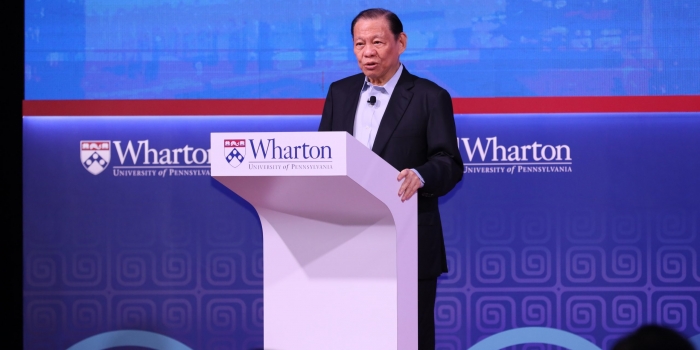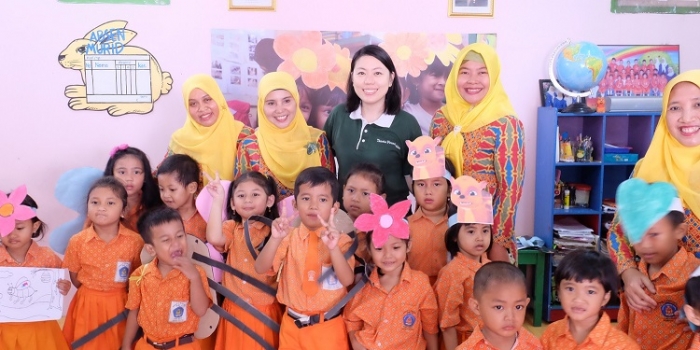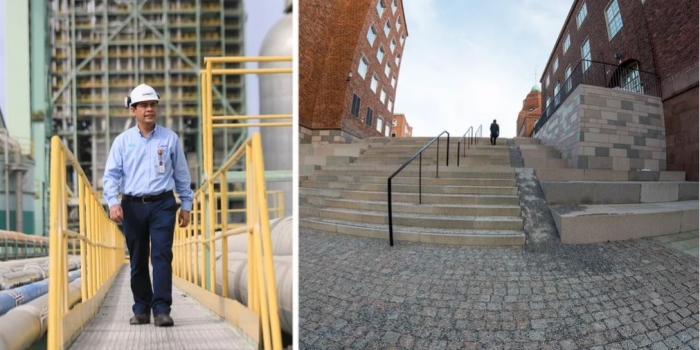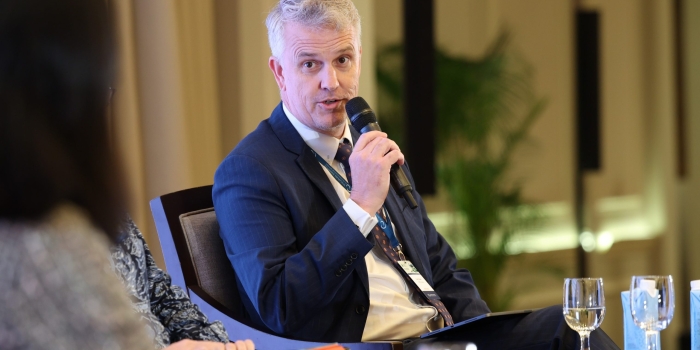Over 700 University of Pennsylvania alumni and prominent business leaders attended the 55th Wharton Global Forum, which was held in Singapore March 10 – 11, 2023. Tanoto Foundation served as a lead sponsor, while RGE senior executives participated in speaking opportunities and the group hosted a booth profiling RGE’s role in driving the bioeconomy.
RGE Chairman Sukanto Tanoto delivered ‘Welcome Remarks’ to help kick off the two-day gathering. Mr. Tanoto reminded participants the Forum was originally scheduled to take place in 2020, when the world was in the early stages of facing down one of the greatest challenges of our lifetimes as we persevered through the pandemic.
“As I reflect back on these three years, the one thing I most remember is the true strength of humanity. It’s amazing what the world can achieve when we put aside our differences, unite and work towards a common objective. For example, the development of vaccines typically takes 10 to 15 years. However, by coming together, we developed not just one, but many Covid vaccines within one year. So, imagine what more the world can achieve if we can come together to address the most pressing challenges of our time,” he said.
Over the course of the first day of the Forum, the 700-plus participants representing 35 countries participated in a range of discussions on business and geopolitical issues globally and within Singapore. The second day of the conference kicked off with a keynote address by Singapore Deputy Prime Minister and Minister for Finance Lawrence Wong. Mr. Wong’s speech can be accessed here.
Later on the second day, RGE Managing Director Anderson Tanoto participated in a panel discussion, ‘Fireside Chat: CEO with CEOs’. Moderated by Ms. Erika James, Dean of The Wharton School, the panel discussion examined ways to provide equal access to workplace opportunities. Anderson was joined by Lance Y. Gokongwei, President and Chief Executive Officer of JG Summit Holdings Inc., who spoke about his personal experience driving one of the largest conglomerates in the Philippines.
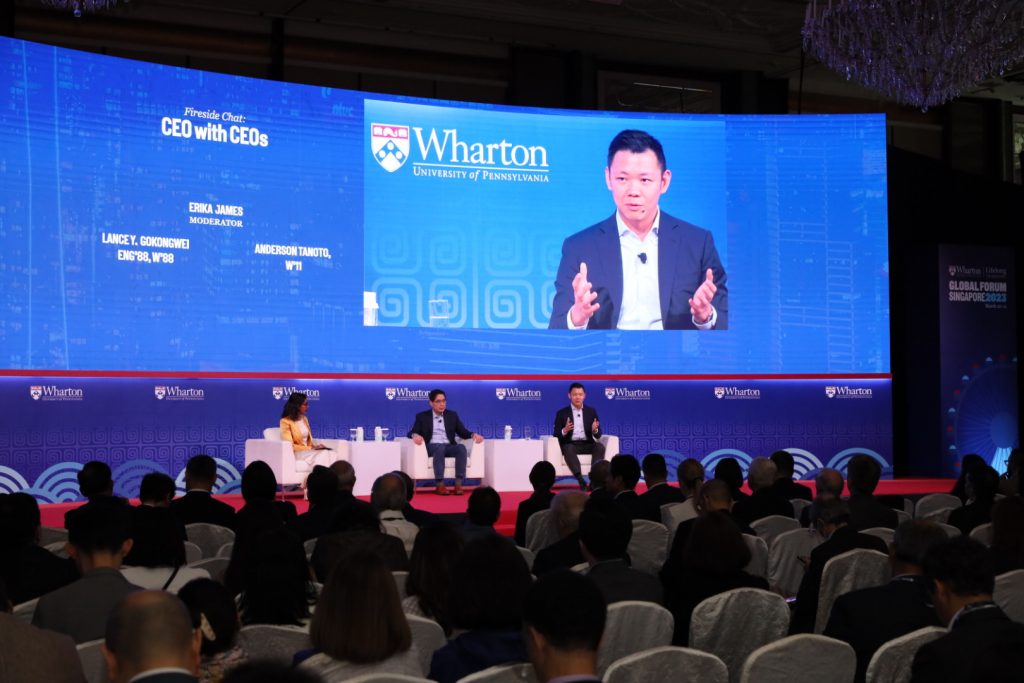
(L-R) Pictured at the panel discussion: Erika James, Dean of The Wharton School; Lance Y. Gokongwei, President and Chief Executive Officer of JG Summit Holdings Inc.; and Anderson Tanoto, Managing Director, RGE
Topics covered during the panel discussion included equity and opportunity in the work environment, and how businesses can tap into the full potential of the workforce through educational opportunities and inculcating an entrepreneurial mindset.
Anderson shared his insights as a Wharton alumnus and an influential leader in one of the world’s most prominent companies driving the bioeconomy. Highlighting the importance of providing equity and opportunity within the company, he shared RGE’s founding principles – the 5Cs – which emphasise the importance of doing good for the community, country, climate and customer, and only then will it be good for the company.
“We strongly believe that when our organisation is aligned with the best interests of community, country and climate, we’re in a strong position to create an inclusive environment to tap the full potential of the workforce. It’s critical to understand that people want to work for a company dedicated to a strong purpose for doing good,” he said.
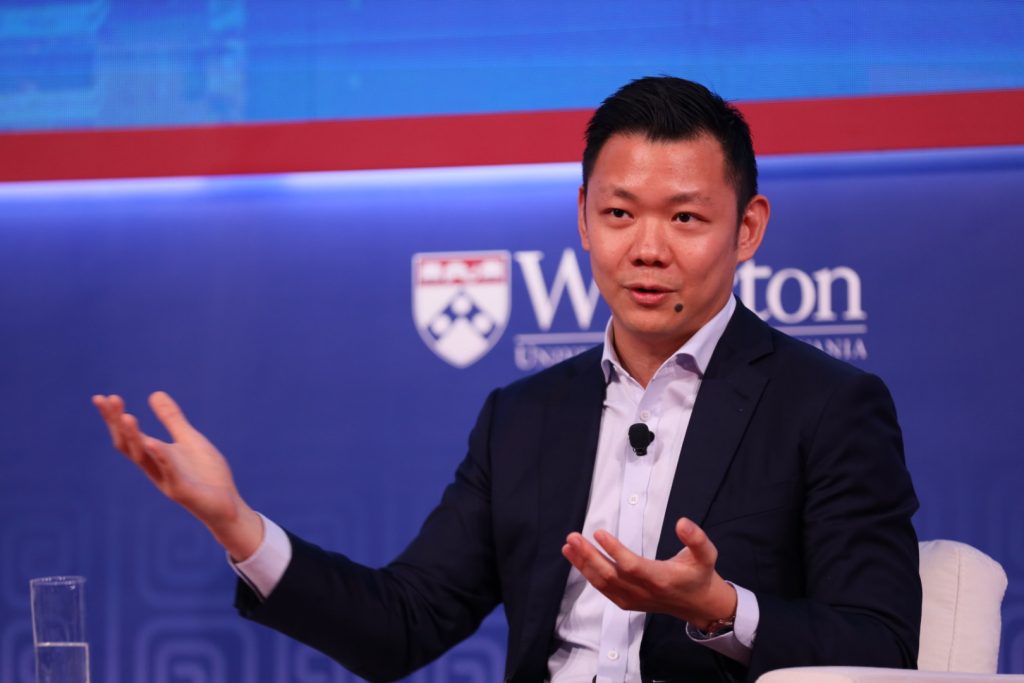
Anderson Tanoto, Managing Director, RGE, speaking at the Wharton Global Forum
Navigating an ever-changing world
Asked about his perspective on what leadership means, and how to navigate the challenges of our times, Mr. Tanoto said: “I have come to the realisation that to be a good and effective leader, you need to practise situational leadership – to exercise different types of leadership in different environments.” Recalling his learnings at Wharton, Anderson said that the best way to become a good leader is to practise it. The knowledge gained through experience, by working with and leading different groups of people to compete in an evolving marketplace, enables effective leadership in today’s tumultuous times.
Mr. Gokongwei spoke about how the COVID-19 pandemic had brought several key learnings to the fore. He emphasised the importance of empathy and compassion, the ability to address opportunities swiftly, and the need to make difficult decisions when needed.
Investing in equity and lifelong learning
To tap the full potential of RGE’s 60,000-strong workforce, Anderson emphasised the importance of a level playing field and the right support system for diverse talents to thrive within the organisation.
He also explained the need for catalytic funding to improve education – the key to reducing poverty. For example, the Tanoto Foundation is investing heavily to widen access and raise the quality of early childhood education in Indonesia. At the same time, it is partnering with several institutions, including Wharton, to drive leadership programmes and encourage lifelong learning. “The concept of lifelong learning is so important if we want to be successful in the era we’re living in today. Knowledge is coming at us at 100 miles an hour. If we stop learning, it’s the beginning of our decline,” he said.
Echoing Anderson’s views, Mr Gokongwei called for closer public-private partnerships and a multi-stakeholder approach to drive greater impact in advancing lives.
Fostering an entrepreneurial environment is key to continued growth
Highlighting the importance of encouraging an entrepreneurial mindset within the workforce, Anderson said that large organisations should embrace agility by removing bureaucracy. This would create an enabling environment for talents across all levels to innovate and contribute to organisational growth. “If you are not able to create agile organisations, you are not going to be able to attract the 25-year-old talents who want to work with you,” he added.
Agreeing with Anderson, Mr. Gokongwei explained that the new generation of workers want their decisions to be heard and their inputs to be considered. As such, his company is pushing agile and skill programmes, and participation in the kind of quick decision-making that has a very entrepreneurial nature.
Finally, Anderson praised Asia for its entrepreneurial environment and flatter organisational structures. In particular, he noted that many Wharton graduates are attracted to Singapore companies due to the more vibrant opportunities that they present compared to companies in the West.



